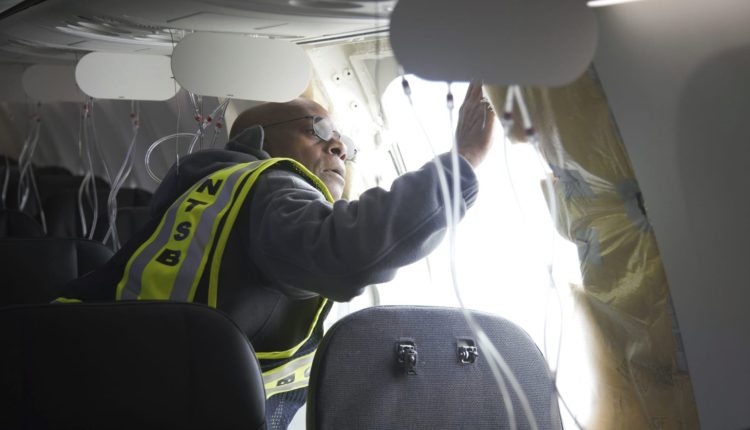In this photo released by the National Transportation Safety Board, investigator-in-charge John Lovell examines the fuselage plug area of Alaska Airlines Flight 1282 in Portland, Oregon, on Jan. 7, 2024.
National Transportation Safety Board via AP
Bolts appeared to have been missing from a door plug that blew out midair on a Boeing 737 Max 9 operated by Alaska Airlines last month, according to a new report from the National Transportation Safety Board.
The Jan. 5 accident left a gaping hole in the side of the fuselage as the plane full of passengers climbed out of Portland, Oregon, and was flying at about 16,000 feet. The panel that blew out is used to plug an unused emergency exit.
“Overall, the observed damage patterns and absence of contact damage or deformation around holes associated with the vertical movement arrestor bolts and upper guide track bolts in the upper guide fittings, hinge fittings, and recovered aft lower hinge guide fitting indicate that four bolts that prevent upward movement of the MED plug were missing before the MED plug moved upward off the stop pads,” the NTSB said in its preliminary report, released Tuesday.
The preliminary report into Flight 1282 provides the most detail yet about what went wrong before the aircraft was handed over to Alaska Airlines late last year.
The fuselage, including the door plug, both produced by Spirit AeroSystems, arrived at Boeing’s Renton plant on Aug. 31. A day later a repair was logged for five damaged rivets, a job that required the bolts to be removed, the NTSB said.
“Boeing appreciates the U.S. National Transportation Safety Board’s work and will review their findings expeditiously. And we will continue to cooperate fully and transparently with the NTSB and the FAA investigations,” the company said in a statement.
The accident prompted a grounding of the Max 9 by the Federal Aviation Administration for much of last month. Most of the Max 9 planes in the U.S. have returned to service.
Boeing’s CEO Dave Calhoun, under pressure to address manufacturing defects that have delayed aircraft deliveries, has said the company is responsible for what went wrong.
“We caused the problem,” Calhoun said on a Jan. 31 earnings call. “Over these last few weeks, I’ve had tough conversations with our customers, with our regulators, congressional leaders and more. We understand why they are angry, and we will work to earn their confidence.”
The FAA is also auditing Boeing’s production lines and last month said it would stop Boeing from increasing production of the best-selling Max jet beyond the current 38 a month it is producing until regulators are satisfied with its production processes.
The Jan. 5 accident occurred just as Boeing was trying to ramp up output.
This is breaking news. Check back for updates.
Read the full article here

